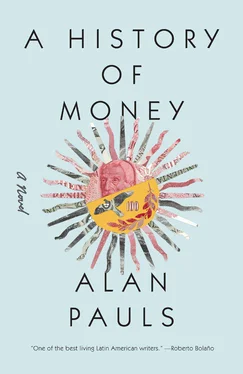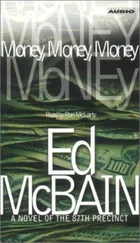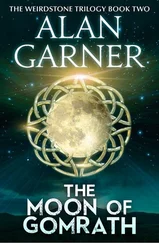He doesn’t want to lean over the coffin for fear that he’ll find a crumb stuck in the corner of his lips. That would be too much. He’s right there, three paces away, now entering the orbit of the crackling but thinking what he wouldn’t give to be somewhere else — ensconced in a cinema, for example, watching one of the Czech or Hungarian films nobody will go see with him at the Communist Party theater, or even just in the room next door, watching like a stowaway from some ignominious hiding place as the dead man’s widow succumbs to the influence of the sedatives, lies down on a bed that’s overflowing with jackets, stretches out those long, bony legs he knows so well, and takes off her high heels with the tips of her toes — and stirring inside him he can feel the same unease he always felt during those lunches in Mar del Plata, when the dead man, talking continuously as ever, as though delivering a monologue, apparently the only style of dialogue he knows, shoved one crostini after another into his mouth. If he’d even restricted himself to that, to chewing them with the patience of an epicurean rodent who uses the crackling as the sound track to its harangues. But no: he also has to relish the feast to which he’s just treated himself, opening and closing his lips as delightedly as a newborn. This unease is as intense as that one; it erases, empties the scene of everything else, everything that distinguishes this moment from those earlier ones and underpins this muffled, slightly underwater world of the fellowship of mourning: the creak of the parquet beneath his trespassing feet, the sweet scent coming from the wreaths of flowers, the shadows filled with sobbing, and even the question that has been circulating constantly, like an open secret, since the early morning when the team of police divers found the dead man at the bottom of the San Antonio River: Where is the money? Beyond any of that, though, what this old unease obscures for him is the terrible evidence that the crostini lover is dead, as mute and rigid as any other dead person, and the flavor of those tiny pieces of toast that drove him crazy with pleasure while he was alive is now as far from his reach as everything else that is of this world, most obviously his two children — the elder of whom is being kept in the kitchen, bribed with a glass of chocolate milk that he refuses to try, while the younger, who’s months old, sleeps in a bedroom under the watch of a maid — and his widow, with her black eyes, her always slightly chapped lips, her milky skin, and her constellations of freckles.
In fact, what this feeling of unease brings back to him is a whole class ritual. Lunchtime is the platform that the dead man uses to play at politics, which in his case, obsessed as he is with the only tragic injustice to which he appears to have any sensitivity — the unequal struggle between vulgarity and good taste — means denouncing the garish orange they’ve decided to paint the traditionally white wicker seats at the beach club, or the streets flooded with music for servants, or the plebeian indecency that has infected the titles of the plays showing over the summer. Less out of politeness than a determination to convince, the dead man looks his interlocutors in the eye while he rants. He passes gracefully from one to the next, committed to winning them over to a cause they have little interest in, and which sooner or later they’ll renounce, having been overwhelmed by a vehemence they have difficulty sharing. And while he speaks, his fingers begin to move, blindly but surely tracing lines of latitude on the tablecloth until they stop next to the little stainless-steel plate, where they catch the edge of the crostini on top of the pile and carry it to his mouth. The operation has a light, almost calligraphic elegance, though the dead man has achieved this only recently, after days of practice. As well as being crispy, the crostini are made of an exceptionally fine substance, and the pores it breathes through give them a vertiginous fragility. They disintegrate on the slightest contact, and once broken they’re worthless. How many times, early on, does he misjudge their consistency — the dead man himself, who declares them a miracle of delicacy while reviling the boorish rusticity of water biscuits — and smash them to pieces no sooner than he’s ripped off their cellophane wrapping, or shatter them while lifting them to his mouth, or make them explode the moment he bites into them, so that an hour and a half later, when lunch is finished and he finally stands up, the proportion he’s managed to get into his stomach is ridiculous compared with the detritus that covers his section of the tablecloth.
Sometimes, seeing him like this, talking and chewing constantly, he doesn’t know what holds him back, what formidable force stops him from reacting, from standing on his seat, getting the red corduroy of the upholstery dirty with his muddy shoes, jumping on the table, trampling dishes, steaming plates, and the white-linen tablecloth fresh from the dry cleaner’s, and launching himself in a suicidal attack on the dead man, shutting him up by taking a knife to his throat, smashing his teeth in, or cutting out his tongue. But time and again, he sits quietly on his chair, his arms falling to his sides, his eyes fixed on a meal he’ll barely touch, while the voice of the dead man and the crunching of the crostini keep weaving their hateful wilderness around him. What else can he do, at his age, and in this enemy territory where not even his mother manages to find her footing — his mother, the one who takes him and leaves him there, swearing and perjuring herself that he has nothing to fear. Fasting: that is his only form of protest. Fasting and, two hours later, in the middle of the siesta, going down to the kitchen, famished, and stealing a stock of water biscuits in a commando raid to gorge himself on with slices of queso fresco alone in his room, with the blinds pulled low and the bedside lamp spitting its solitary cone of light onto a comic book. Fasting and waiting in silence, with his suitcase mentally packed and his heart pounding, for the first of February to come once and for all, so that his father will take him on holiday far, very far away from there, it doesn’t matter where.
As if that were possible. Because there is no escape, not in space or in time. The proof is that eight years later, when the crostini lover is lying faceup with his hands crossed on his chest, and he is fourteen years old, all of his hormones at war and no obligation, now, to sit down at any table in any enemy territory, the music that fills his ears is not the grandiose trumpets of “Jerusalem,” the song that opens Brain Salad Surgery, the Emerson, Lake & Palmer CD that he spends hours listening to, locked in his bedroom, but the crunching of the dead man’s jaws showing no mercy to those fucking crostini. In fact, it’s around this magnetic sound, which he could single out and recognize anywhere, like an epileptic detecting the peculiar atmospheric conditions that foreshadow a fit, that he has, over the years, absorbed and organized everything he’s learned about the man from others or through firsthand observation, things he probably notices and remembers only because they come to him associated with, forever fused with that crackling sound, and the crackling, in turn, with the gust of unease that unfailingly assails him, and then with the urge to get up from his seat, jump on the table, put a knife to the dead man’s throat, et cetera. It’s this sound that comes to him when anyone mentions the dead man’s name in conversation, this sound that eclipses all others, including the din of the cicadas, when he leans out the window of his room in the mansion in Mar del Plata and sees the notorious Italian convertible coming to a halt in front of the closed door; that forces itself upon him every time he arrives home from school to find, scattered all over the house, the signs that betray his presence, convincing him to go to his room by the route on which he’s sure to avoid meeting him: the blue blazer with its gold badge hanging from the back of a chair, the packet of cigarettes with the solid-silver Dupont lighter on top, and the reddish-brown leather attaché case with his initials burned into the skin, branding-style, which he always carries with him, which they say he was also carrying with him the morning he boarded the helicopter heading to Villa Constitución, and of which there is no trace whatsoever when, after combing half the delta, the four police divers finally find the helicopter and bodies at the bottom of the San Antonio River. Vaporized, disappeared in a puff of smoke, along with everything that is believed to have been inside it, papers, documentation, pay stubs, checks, and, most important, the bundle of money entrusted to him that morning to be taken to the plant in Zárate, undeclared money, obviously, given the rather underhand ends for which it’s destined, though its presence in the attaché case is confirmed in low voices by a couple of employees of the powerful iron-and-steel company he works for, which has been hit for more than three weeks by a union conflict and is now disrupted by sudden stoppages in production, by the election by absolute majority of an internal committee that’s redder than the blood that will soon flow, by threats to seize the plant for an indeterminate period, and by the death in rather mysterious circumstances of one of the conflict’s key figures, the only person capable of either resolving or detonating it.
Читать дальше












